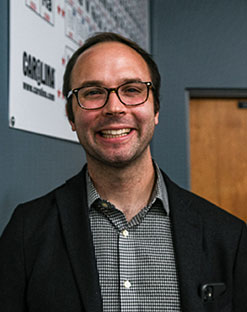Computational Biology Adds Up to a Bright Future for You
If you like biology and math, you might want to consider a computational biology major.
What is computational biology?
 In this field, biologists use computer programming to analyze biological data, particularly DNA sequencing. This information could improve medicine or help with treatments for diseases like cancer.
In this field, biologists use computer programming to analyze biological data, particularly DNA sequencing. This information could improve medicine or help with treatments for diseases like cancer.
PC alumnus Bobby Keskey ’11 knows how important the field is for answering complex questions that may improve human health.
Bobby is in his general surgery residency at the University of Chicago. He’s conducting microbiome research as he pursues a Ph.D. in immunology.
While Bobby graduated with a degree in biochemistry, a bioinformatics course started him on his way to high-level research.
“It’s something that I think is pretty valuable and an introduction into a field that I think has really grown in probably the past five years or so,” Bobby said.
The Computational Biology Major
Bobby perked up when he heard about PC’s new computational biology major.
“Anyone who wants to do any kind of biological research these days needs to have some familiarity with computational biology. It’s a reflection of where the field of science is headed,” he said.
“Everything’s Big Data, and you need computers and software to interpret that Big Data. So having the ability to use those tools to interpret the data yourself really allows you to do successful research.”
Bobby examines bacteria in his Ph.D. work. Researchers have been able to recognize millions of different kinds of bacteria because of new sequencing technology.
“Different algorithms that fall under computational biology allow researchers to interpret and understand what these different communities of bacteria mean,” he said.
Bobby uses computational biology to understand how surgical patients recover after infection, how they recover after surgery, and how these bacteria are changing.
“Without the field of computational biology, I wouldn’t be able to truly interpret the vast amount of information that we’re able to get on these bacteria,” he said.
The Knowledge to Take on Big Data
Bobby says he can take on data analysis because of his biological background. And he’s grateful that it began at PC.
“I think computational biology makes the job easier, and it makes the interpretation of the data a little bit smoother and easier to understand,” he said.
He still emails his former professors at PC, like Dr. Stuart Gordon, about his work. He remembers the classes that most prepared him for the work he’s doing now.
“I could probably go on about every professor I had, and I gained something from those classes,” he said. “It’s really not one particular class or professor that I think shaped where I am today but more my experience in general.”
Graduating from Med School with Honors
Bobby graduated with honors from medical school at the University of Louisville before moving on to his residency at the University of Chicago. He’s published numerous papers along the way too.
It all began, he says, in the small-classroom environment.
The direct interaction with professors at PC made him think critically, so he understood concepts from a biological standpoint. And the smaller laboratory experience helped him better learn the techniques he practices today.
“I’ve been at bigger universities,” he said. “My peers learned the same information, but a lot of the times, the way we thought about stuff at PC was a little different.”
Bobby said he could engage with professors who are “genuinely interested in teaching the material. Professors encouraged him to truly think about the material and apply what he learned.
Visit Campus
There’s no better way to see what campus is like than to experience it yourself. If you’ve been admitted and visit in April, you’re automatically entered to win a MacBook Pro! Sign up on Visit Campus.
